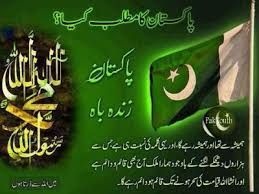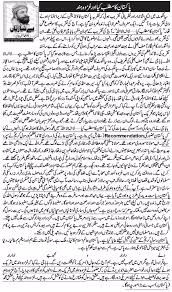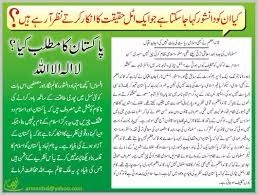“Neither the Muslim League Working Committee nor I ever passed a resolution [called] 'Pakistan ka matlab kya' — you may have used it to catch a few votes,” said Quaid-e-Azam Mohammed Ali Jinnah when a Muslim Leaguer chanted this slogan at the last session of the All India Muslim League.
Unfortunately, the slogan-monger prevailed over Jinnah.
Those who believe in this slogan now dominate Pakistan. Those who remember what Jinnah said on this or other occasions can be counted on fingers.
The poem, “Pakistan ka matlab kya,” was written by a schoolteacher from Sialkot, Asghar Sodai. He lived a long life (Sept. 26,1926 – May 17, 2008) but never had any direct political influence.
His poem, however, proved to be the most influential piece of poetry ever written in Pakistan. It was more influential than the poetry of Iqbal and Faiz put together, seeing as this single poem shaped the country’s official ideology.
Pakistan was carved out of India because the Muslims of the subcontinent demanded a separate land for themselves. They did so because they felt that an early exposure to Western education and British patronage had put India’s Hindu majority well ahead of them. They could not compete with them in a united India.
The Pakistan Ideology: History of a grand concoction
But the leaders of the political movement that led to the creation of Pakistan were secular Muslims, who appeared more interested in creating a British parliamentary democracy than an Islamic state.
Most of those who could have had a desire to create an Islamic state, the subcontinent’s Muslim clerics, were against the creation of Pakistan. This, however, did not prevent the same clerics from trying to convert Pakistan into an Islamic state once it was created.
The effort to forge a single religious identity out of half a dozen ethnic groups, each having a distinct language and culture, had the consequences that all such efforts do. Whether Jinnah wanted an Islamic state or not, however, is now irrelevant. Islam is the state religion and it is written in the Constitution.
The army has been trusted with the job of protecting the country’s ideological frontiers, along with the real borders. As Pakistan’s brief history shows, the army always invoked the holy task whenever it toppled an elected government, and rightly so; the constitution indeed gives the army the responsibility of defending both Pakistan and Islam.
But has this constitutional Islam helped Pakistan? Apparently, not.
Just seven months after Partition, it became clear that Islam was not enough for some of the Muslims of this state. They wanted more.
The first threat to the new Islamic republic came from its most vulnerable point, the former East Pakistan. The Bengali Muslims, who once backed the Pakistan movement to end Hindu domination, soon felt that the new state was challenging their very identity as Bengalis.
Pakistan became independent on Aug. 14, 1947, and on March 24, 1948, Jinnah addressed a special convocation at the Dhaka University where he declared that Urdu will be the only national language of Pakistan. The students chanted, “no, no, no,” telling him that they wanted this status for their language, Bangla.
On Nov. 27, 1948, a young student Ghulam Azam read the welcome address for Prime Minister Liaquat Ali Khan when he visited the university. Ghulam Azam reminded Liaquat that they wanted two things, provincial autonomy and Bangla as a state language.
This very same Ghulam Azam later founded Jamaat-e-Islami Bangladesh and gained notoriety for his alleged role in war crimes during the Bangladesh Liberation War of 1971. On July 15, 2013, a tribunal sentenced him to 90 years in prison.
The Bangla language movement continued to spread and reached its climax on February 21, 1952, when police killed a student demanding official recognition for their language. On Nov. 17, 1999, UNESCO declared February 21 the 'International Mother Language Day' for the whole world to celebrate.
Political Islam: Rise, fragmentation and possible fall
In 1956, the central government granted official status to the Bengali language but by then it was already too late. After a long and bloody struggle, in 1971 East Pakistan became Bangladesh.
Bengalis opted out of Pakistan but they remained a Muslim nation. Mosques in Bangladesh have more namazis than those in Pakistan do. Their madrassas produce more scholars — most of them non-jihadis — than those in Pakistan do. The Bangladeshi Tableeghi Jamaat is larger than its Pakistani counterpart. Even religion-based political parties have a larger following in Bangladesh now than they did before 1971.
This contradicts the claim that Islam and Pakistan are inseparable, and that separation from Pakistan also means separation from Islam.
This obsession with linking religion and politics has hurt Pakistan, both internally and externally. Like Bengal, in three of the four remaining provinces — Sindh, KP, and Balochistan — many view this obsession as an excuse for suppressing their own separate ethnic and lingual identities. They also believe that the centre uses Islam to prolong its control and to continue the economic exploitation of the smaller provinces.
Externally, other nations — including those in the Muslim world — have always ridiculed Pakistan’s claim that it is the leader of the Islamic ummah.
The first nation to ridicule Pakistan’s leadership claims was Egypt, not India.
King Farouk of Egypt, who ruled from April 23, 1936 to July 26, 1952, famously snubbed Pakistan’s Islamic pretensions.
During a recent visit to Washington, a group of Pakistani journalists were offended when an Arab journalist politely told them that his government had asked him not to mix up with Pakistanis. Asked why, he said: “Most Pakistanis have links with terrorist groups.”
Pakistanis living in the West often have similar experiences when they try to befriend people from other Muslim nations. Muslims in other regions – from Egypt to Indonesia and North Africa to Central Asia – equate Pakistan with terrorism, not Islam.
Terrorists who attacked the United States on Sept. 11, 2001, were all Arabs, mostly Saudis or Saudi-inspired, but few blame Saudi Arabia. Pakistan gets the blame because in their eagerness to display their Islamic credentials, many Pakistanis openly express their sympathies with these jihadi groups.



During the Afghan war, Pakistan foolishly allowed terrorists of all ilk and color to settle in the country, practice jihad and train local jihadis. By 1990s, the country had tens of thousands of hardened jihadis and soon they became so powerful that they started dictating their terms to their Pakistani handlers.
So far, more than 50,000 civilians and 6,000 Pakistani troops have been killed by these jihadis. Some of them have been mercilessly slaughtered like sheep upon capture. Other victims have been blown to pieces by suicide-bombers eager to join the company of virgins waiting for them in heaven.
Pakistan has now launched a major military offensive to defeat the jihadi militants, but many across the world still doubt its sincerity because of the country’s past affiliations with these groups.
The time has come for Pakistan to break up its ties to these groups and learn to live as an independent, secular, and honourable nation. This does not involve severing our ties to Islam.
Even as a secular state, Pakistan will remain a Muslim nation, as most other Muslim states do. We can still be proud of our Islamic heritage without any ties to the religious militancy that the world has come to associate Pakistan with.



